


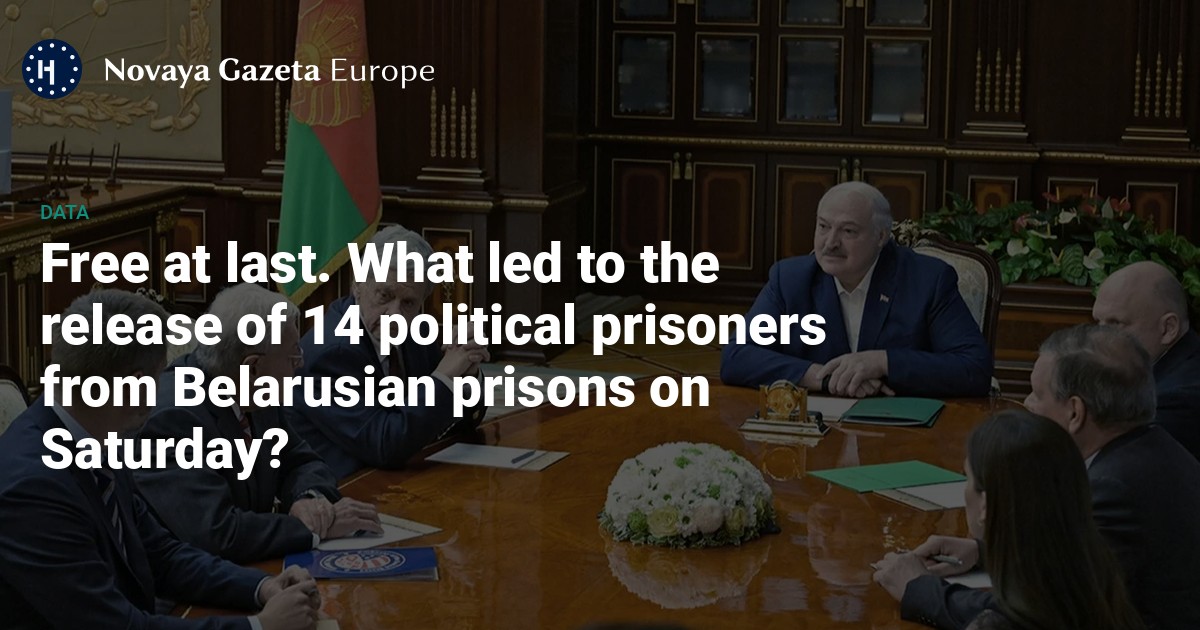
When Keith Kellogg, the US presidential envoy for Ukraine, arrived in Minsk last week, Belarusian opposition circles were immediately rife with speculation that a fresh round of political prisoners could be released by the country dubbed “Europe’s last dictatorship”.
Grounded in recent events rather than purely wishful thinking, the speculation turned out to be correct on Saturday when 14 of some of the most prominent political prisoners held in Belarusian jails finally walked free, including a man many believed would never again live to see the light of day — if he was even still alive at all — Siarhei Tsikhanouski.
While surprising, the visit of such a senior member of the US administration was not entirely unprecedented, and, indeed, such high-level encounters between Washington officials and the great political survivor who is Belarusian dictator Alexander Lukashenko rarely take place without a very specific trade on the table. The names and exact numbers of those slated to be freed in any deal may have been unknown, but the logic was sound: another round of prisoner releases was likely underway.
The message was clear: Minsk is open to trading its scores of political prisoners, but any further releases would not come cheaply.
When US Deputy Assistant Secretary of State Chris Smith paid a secret visit to Minsk in February, both sides were keen to reduce conjecture and lower expectations by making no announcements, avoiding any press coverage, and ensuring that no photos of the trip would emerge.
Speaking to CNN subsequently, Smith rather unfortunately described that mission as a “special operation”, inadvertently echoing the official term used in Russia to describe the invasion of Ukraine. He told the network how he had crossed stealthily into Belarus, met in person with Lukashenko and his KGB chief Ivan Tertel, and managed to secure the release of three political prisoners, who were transported to Lithuania with hoods over their heads and their hands cuffed.
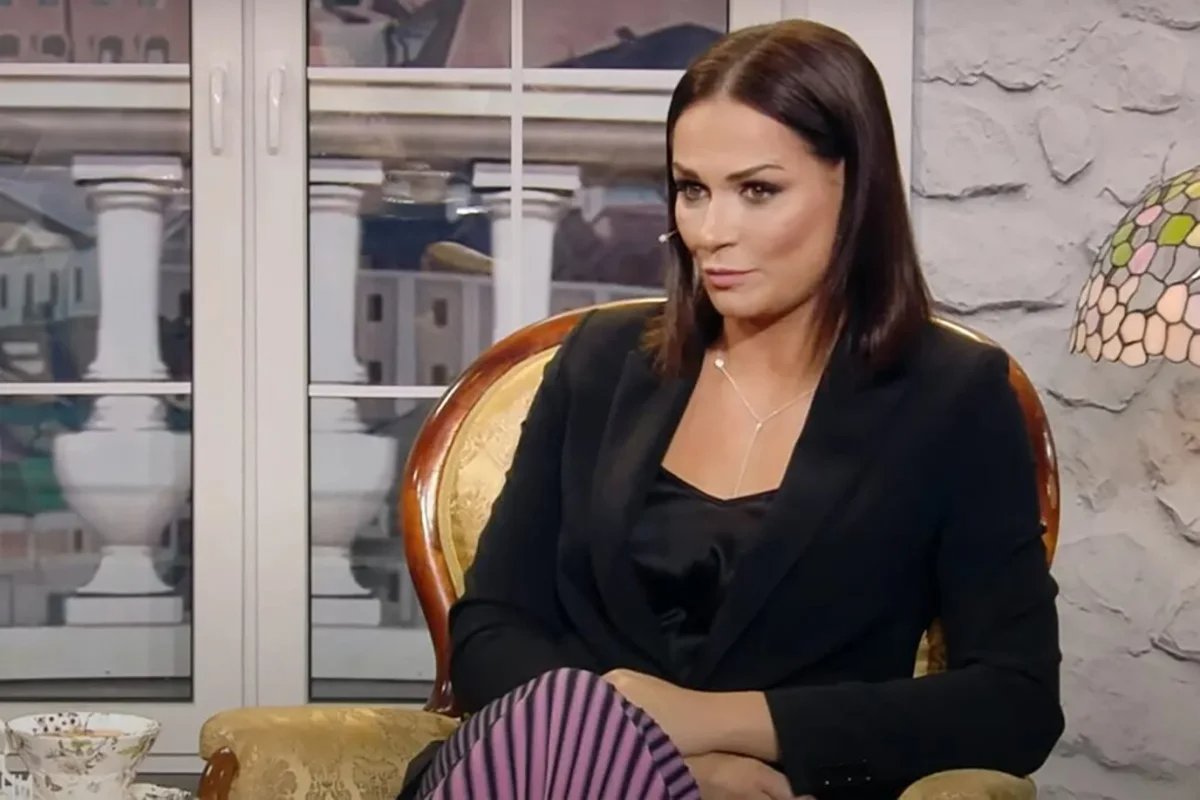
Lukashenko’s press secretary Natallia Eismant. Photo: Telegram / @charter97_org
Those released were Mykola Shuhayev, a dual Ukrainian-American national; Radio Free Europe/Radio Liberty journalist Andrei Kuznechyk; and Yelena Movshuk, who was imprisoned for taking part in anti-Lukashenko protests in the city of Pinsk in August 2020.
In late April, Kellogg’s deputy, John Coale, also travelled to Minsk. Shortly afterwards, Yury Ziankovich, a Belarusian-born US citizen who in 2022 was sentenced to 11 years prison for his alleged role in plotting a coup against Lukashenko, was suddenly released. In a post on X, US Secretary of State Marco Rubio framed Ziankovich’s release as part of a broader effort by the Trump administration to repatriate unjustly detained imprisoned US citizens not only in Belarus, but also in Afghanistan, Russia and Venezuela.
Of course, the picture painted publicly by the Belarusian regime was one of regal generosity: a visiting dignitary, a presidential pardon, and a symbolic return to freedom.
On 1 May, Lukashenko’s press secretary Natallia Eismant confirmed the release, saying it had been granted at the request of the White House. She said that “requests of this nature are not new and continue to be received,” before adding that Minsk preferred to keep such negotiations confidential. The message was clear: Minsk is open to trading its scores of political prisoners, but any further releases would not come cheaply.
Then, on 21 June, 14 more political prisoners were suddenly pardoned and freed — among them the most symbolic figure of all: Siarhei Tsikhanouski, the former opposition candidate who had committed the crime of realistically standing to beat Lukashenko in the 2020 presidential election, whose wife, Sviatlana Tsikhanouskaya, subsequently took on the role of Belarusian opposition leader, and was then forced into exile in Lithuania.
As with Ziankovich, Eismant was quick to frame the pardon as a gesture tied to a foreign request — this time, from Donald Trump himself. “The decision to pardon 14 individuals was made at the request of the president of the United States,” she said. “Most are foreign nationals: two from Japan, three from Poland, two from Latvia, and others from Estonia, Sweden and the US. Several Belarusians were also included — all convicted of extremist or terrorist activities. The decision to release Siarhei Tsikhanouski was made for humanitarian reasons, to allow for family reunification.”
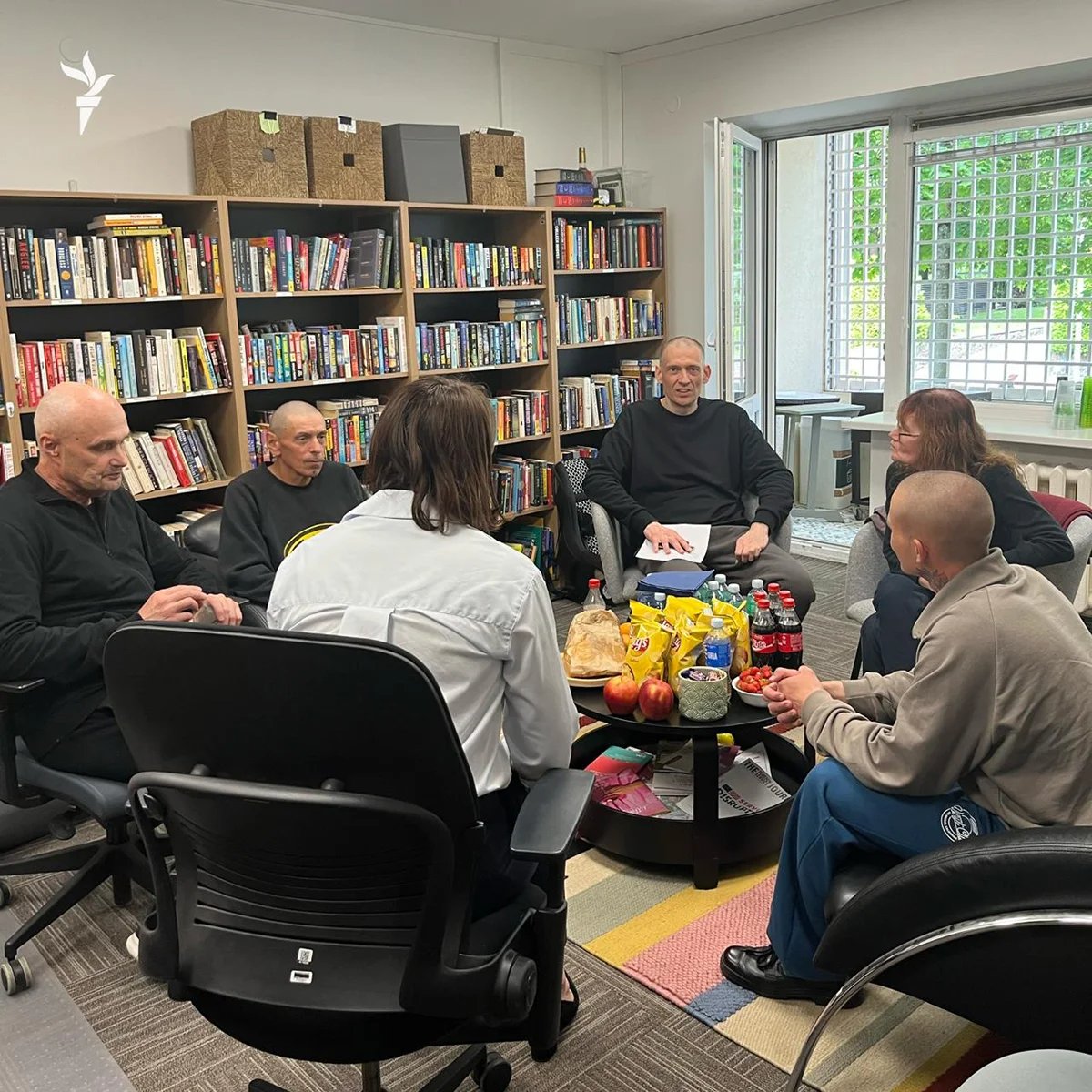
Siarhei Tsikhanouski and other Belarusian political prisoners following their release. Photo: Radio Svaboda
Of course, the picture painted publicly by the Belarusian regime was one of regal generosity: a visiting dignitary, a presidential pardon, and a symbolic return to freedom. But Ziankovich, in an interview with German public broadcaster Deutsche Welle, revealed the far grimmer process he was subjected to before his release: he was removed from his prison colony as early as 3 January, held for months in KGB detention, and eventually transported by masked security escorts via backroads, undergoing changes of number plates to the Lithuanian border. His release was no miracle, but the culmination of prolonged, painstaking negotiation.
Tsikhanouski’s case, however, does border on miraculous. Unlike others, he was never expected to walk free. In October 2020, with the government crackdown on the mass protests against the results of the stolen 2020 presidential election still in its early stages, Lukashenko paid a visit to a KGB pretrial detention centre, accompanied by his son Kolya. There, he spent nearly five hours speaking — mostly at — his jailed opponents, including former presidential candidates Viktar Babaryka and Tsikhanouski, though they did occasionally manage to get a word in themselves.
Tsikhanouski warned Lukashenko that after his death, his children would still be alive to answer for his crimes, causing an enraged Lukashenko to snap back that his adult son Kolya would never have to face any questions.
In fact, Belarusian state media did broadcast one interaction between the dictator and his prisoners: Tsikhanouski asked, “When will you release me?” to which Lukashenko responded, “Why are you asking me? Your president is in Lithuania” — referring to Tsikhanouski’s wife Svetlana, who now leads the United Transitional Cabinet of Belarus from Vilnius.
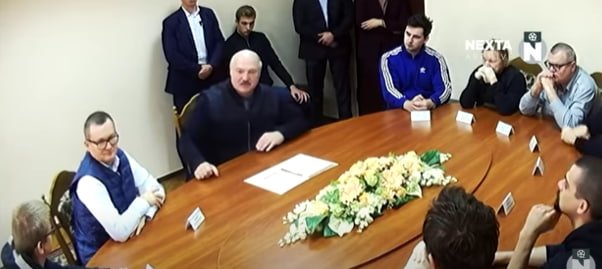
Lukashenko with his son Kolya (behind him) at a meeting with political prisoners at the KGB pretrial detention centre in October 2020. Screenshot: NEXTA / YouTube
But other far more telling parts of the exchange were never aired by Belarus’s tightly controlled state media outlets, such as the moment when Tsikhanouski warned Lukashenko that after his death, his children would still be alive to answer for his crimes, causing an enraged Lukashenko to snap back that his adult son Kolya would never have to face any questions, adding, “He’ll be an ordinary citizen. Don’t go after my children — particularly as I don’t go after yours!”
Nobody had ever spoken to Lukashenko like that, least of all a jailed opposition blogger. Tsikhanouski, who was arrested in May 2020 before even being able to join the mass protests that almost unseated Lukashenko, was given an 18-year prison sentence in late 2021. Later, another 18 months were added for alleged disobedience in prison. By March 2023, he had been placed in solitary confinement and was no longer allowed any communication with the outside world, meaning that nobody even knew if he was still alive.
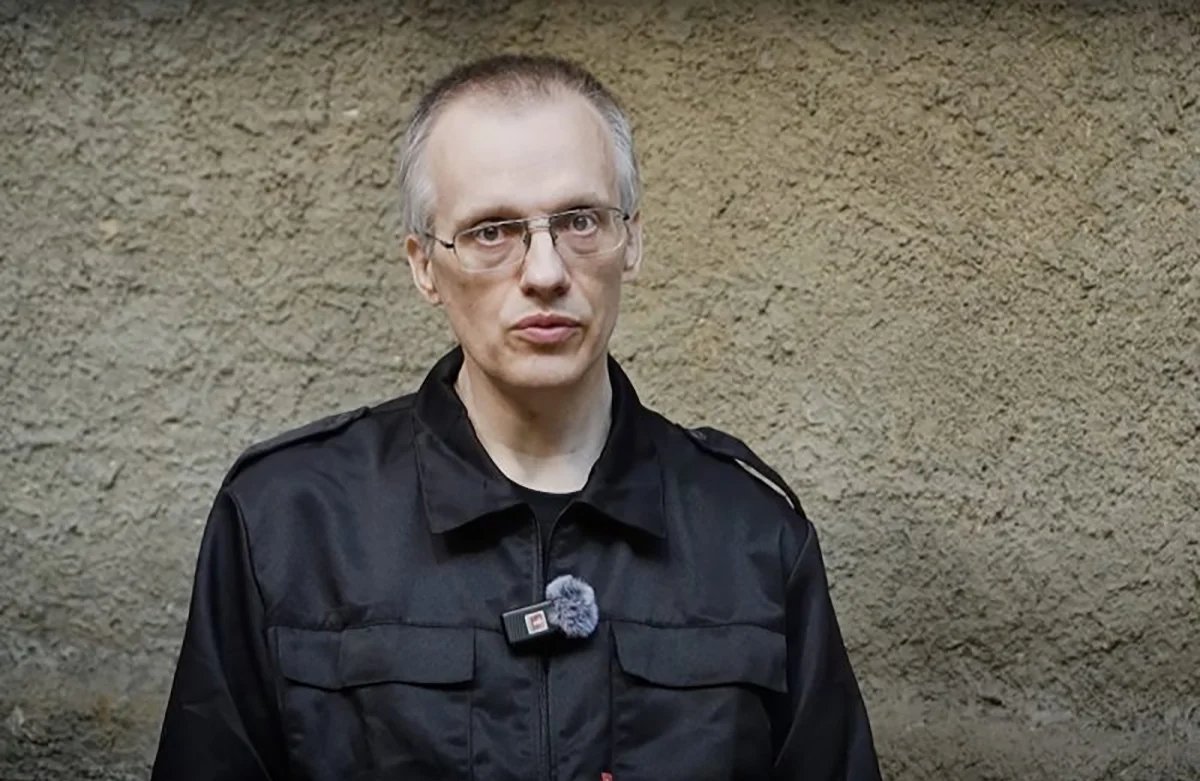
Yury Ziankovich. Photo: spring96.org
Compared to Ziankovich’s months of preparatory manoeuvres, Tsikhanouski’s release seemed to come suddenly. The prisoners freed on 21 June were still in their prison uniforms, suggesting that the decision to release them had been taken shortly beforehand. Yet the brutal and dehumanising pattern of their release went unchanged: instead of being transported directly to Lithuania, they were rerouted through high-security KGB facilities where they were hooded or blindfolded without being informed what was happening before being delivered to a rendezvous at the border.
Coale, who facilitated both Ziankovich’s release and the latest round, shared a brief video on social media describing the moment the van arrived. “I opened the door and they all had their heads down and they didn’t know what was going on,” he said. “ I said: ‘You’re free. You’re free.’ Some of them spoke English, and told the others, and everything changed. They had no idea where they were going. They could have been going to a terrible place.”
Of the 14 released, six were Belarusian, the rest were foreign nationals. Yet the inclusion of Tsikhanouski — a personal enemy of Lukashenko — is proof of just how much leverage Washington continues to hold. That pressure will need to continue, however, as while a handful of cells may now have emptied, arrests and prosecutions continue — even for protest activity dating back to 2020.
Since the initial prisoner release in February, Belarusian human rights group Viasna has designated another 141 individuals as political prisoners.
Since the initial prisoner release in February, Belarusian human rights group Viasna has designated another 141 individuals as political prisoners. Opposition figures like Viktar Babaryka and Mikola Statkevich remain behind bars, as do hundreds of others with little or no public profile.
Officially, Kellogg’s visit to Minsk was framed as a discussion of “international affairs and the global situation”, but the fact that KGB chief Ivan Tertel was present at every meeting was evidence that despite the use of diplomatic euphemisms, something else entirely was on the table.
For the independent journalists, human rights activists and members of the public who simply decided to take to the streets after witnessing yet another stolen election in Belarus, for the family members of those unfairly imprisoned and for anybody else invested in Belarus having a functioning civil society, that remains the main story, and one that was years in the making.
The Russian government has banned independent media. We were forced to leave our country in order to keep doing our job, telling our readers about what is going on Russia, Ukraine and Europe.
We will continue fighting against warfare and dictatorship. We believe that freedom of speech is the most efficient antidote against tyranny. Support us financially to help us fight for peace and freedom.
By clicking the Support button, you agree to the processing of your personal data.
To cancel a regular donation, please write to [email protected]
VPNovaya
Help Russians and Belarusians Access the Truth
